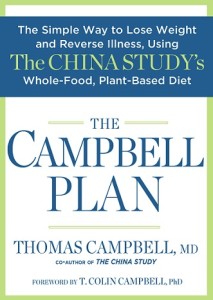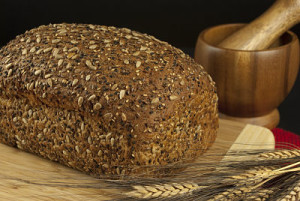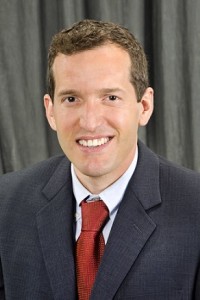Dr. Thomas Campbell Puts You In Charge of Your Own Health
As a family physician and coauthor of The China Study, Dr. Thomas Campbell is eminently credible in showing the power of a whole foods, plant-based diet in transforming your health. His book The Campbell Plan has three main characters. One is Dr. Campbell himself, the second is science, and third is food in its many forms.
Dr. Campbell shares personal anecdotes, some amusing and the last one heart-breaking, throughout his book. I especially enjoyed the glimpses of his early years and what it was like to grow up in the Campbell family.
You feel Dr. Campbell is there advising you with helpful tools and information. He knows that for you to succeed, you must be in control and want to make a real change. From the beginning, he encourages you to think about the health goal you’d most like to achieve. He understands you may struggle sometimes, and guides you to the personal resolve and social support you need to get through the rough patches and reach your goal. You have leeway to form new eating habits on your own terms. One tool the book uses in several places is a scorecard with six key elements for

The Campbell Plan will show you how to move to a whole foods, plant-based diet with a lot less effort than you might have imagined
achieving and maintaining lifestyle change.
Science is the foundation of the whole foods, plant-based diet that Dr. Campbell recommends. Several chapters address controversies in nutrition, from wheat and soy to fish and supplements, and more. The Campbell Plan describes the evidence from published studies on both sides of an issue before giving bottom line advice. The book discusses the research with a readable style that will give you confidence in the recommendations, even if science was your least-favorite subject in school.
Finally, there’s the food. The Campbell Plan offers a detailed description of a two week trial – or experiment, as Dr. Campbell suggests you think of it – with a whole foods, plant-based diet. Ideally, you get rid of the foods you want to be avoiding during that time, or at least make them super inconvenient to reach.
You can feel confident shopping for new foods with the shopping list and meal plan that the book provides. The 55 recipes included are simple to prepare, aimed at busy people who want an enjoyable meal without hassles. Dr. Campbell shares a number of recipes his own family frequently eats, as well as a list of his favorite cookbooks and recipe sites for many more ideas to sample. He also talks about nutrition during pregnancy and how to feed children.

Is wheat healthy? What effects might it have, and who needs to be concerned? Overall, how big a contributor is it to chronic illness? Dr. Campbell has detailed, thoughtful answers to these questions
I was excited to talk with Dr. Campbell to learn more about his work with patients and his goals in writing his book. I started by asking Dr. Campbell about the dilemma patients face in deciding between prescription drugs and adopting a healthier lifestyle. “Often I’m the first doctor telling them it will make a real difference if they give up the foods they most love and start eating lots of foods they are not that fond of. It’s not a message that anyone would want to hear,” Dr. Campbell shared. “Patients are not at fault. The medical system does not provide a structure that supports change. People need education, the science, cooking classes, and shopping tips – yet none of these are part of the system. I don’t have time in a standard office visit to talk about the research or have patients sample a healthy meal. I’m always looking for teachable moments, when a patient gets a scary test result, for example. This can be a means of connecting with both the patient and their family on the effectiveness of moving to a whole foods, plant-based diet.”
I asked Dr. Campbell how the health care professionals we works with regard his advocacy of a whole foods, plant-based lifestyle. “My colleagues are respectful of my focus on nutrition, but they don’t use nutrition in their work because the knowledge base is not there for them. Many doctors simply advise patients to eat less sugar, or count carbs. Again it’s a systems failing. People have not been systematically trained to use diet in treating patients,” Dr. Campbell observed.
My next focus was on finding out more about why Dr. Campbell wrote The Campbell
Plan. He pointed out The China Study has a few pages on diet, but many people need more information and support. “We were still getting a lot of questions on nutritional controversies. I wanted to answer those questions for the public. Plus new research is being done that’s important for people to know about. Two weeks is a reasonable time to pilot dietary change and start to achieve measurable health improvements. I wanted to share with as many people as I can how that can be done. The book is meant to be a resource.”
Yes, The Campbell Plan is a practical, readable resource for your own health transformation. You can get started on a whole foods, plant-based diet right away. Or if you’re not yet ready to change, use this book as a guidepost to gain critical information and skills you’ll need for the future.
If you enjoyed this post, you may want to learn more about stages of change, so you can see how ready you really are to move toward an optimal diet.
Intrigued? Now you can use our Whole Foods Blog Finder to target informative, fun postings on whole foods, plant-based diets. Quick information at no cost!
Blog posting by Janice Stanger, Ph.D. Janice authored The Perfect Formula Diet: How to Lose Weight and Get Healthy Now With Six Kinds of Whole Foods, a science-based book on whole foods, plant-diets.
Tags: Dr Thomas Campbell, The Campbell Plan, The China Study, whole foods plant-based diet, whole foods plant-based recipes






